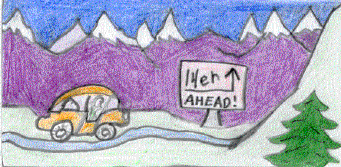Mountain Do's and Don'ts

The mountains are beautiful and they can be fun. However, all sorts of misadventures can befall you if you are unprepared. Taking a few precautions can make your trip a safe one.
![]()
- Altitude sickness is no joke, especially above 8,000 feet. If you feel a persistent headache, nausea, dehydration, or dizziness, give yourself a day to acclimatize before going to higher elevations; if the symptoms are bad enough, get to a lower elevation immediately.
- Drink extra water in the mountains, at higher elevations especially in Colorado's low-humidity climate where water loss is rapid.
- Layer your clothing and start hikes early in the morning to avoid being on the trail during late afternoon thunderstorms. Severe storms are brief but can occur in minutes.

- Higher elevations offer lower-than-normal protection against ultraviolet rays. When spending time outdoors, always wear a hat and sun block, even on cloudy days.
- Mountain Roads are steep. High altitude can affect a car's performance and handling. Have your car checked for high altitude performance before heading into the mountains.

![]() Fun Facts!
Fun Facts!
- Colorado's Rocky Mountains boast 54 peaks over 14,000 feet tall. At 14,433 feet, Mount Elbert near Leadville is the highest point in Colorado.
- The Continental Divide separates waters of the Pacific from water of the Atlantic. Colorado boasts more than 65,000 miles of streams, nearly 2,500 cold-water lakes and reservoirs, and 360 warm-water lakes.
- Colorado boasts more microbreweries per capita than any state.
- The Moffat Tunnel is the second-longest railroad tunnel in the united States.
- From 1907 to 1948, Ivy Baldwin performed a high-wire act across Eldorado Springs Canyon on a 580-foot-high steel cable.
- Western Colorado is part of the famed "Dinosaur Diamond."
- The Morrison Formation, just west of Denver, yielded the largest brontosaurus bones ever excavated.
- Grand Mesa, just east of Grand Junction, is the world's largest flat-top mountain. Grand Lake is the largest natural lake in Colorado.
- Colorado boasts 255 days of sunshine yearly, the hottest month is July, the coldest month in January and has an average of only 40 percent humidity.
![]() Home
Parks & Recreation
Favorite Campgrounds
Home
Parks & Recreation
Favorite Campgrounds
Pitfalls Park Links Touring Colorado